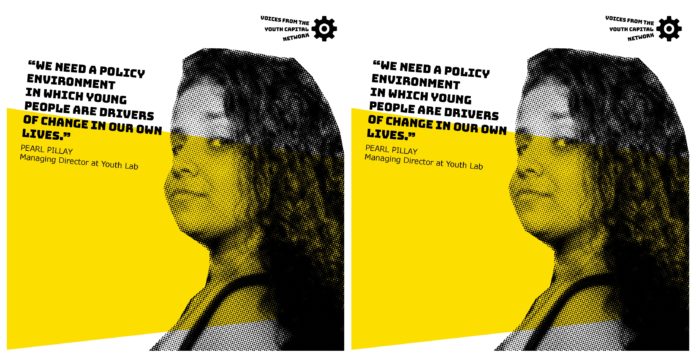Youth Capital releases an annual publication that combines data with young people’s lived stories to shift gears on youth unemployment. The 2021 publication, Unlock Jobs: Clearing Roadblocks to Youth Employment aimed to answer a question. The questions were about how to start clearing the roadblocks on young people’s journey to quality work. To do that, they spoke to several voices from their network. These interviews are published below.
RELATED:
The Daily Vox and Youth Capital partner to inspire young people to #BeTheDrivingForce
Pearl Pillay, Managing Director at Youth Lab: We need a policy environment in which young people are not simply passengers, but drivers of change in our own lives.
YOUNG PEOPLE AS DRIVERS OF POLICY DEVELOPMENT
The policy landscape in South Africa, particularly as it relates to youth, can best be described as a complex web that attempts to strike a balance between ideas, innovation, and inclusion; whilst running through a gauntlet of politics, access, and inequality. For many young people, policy is seen as a pursuit of the elites – those who have attained a certain level of education and who speak, think, and behave in a certain way; thus, highlighting the intersections of class, race, and gender as well as the ways they are manifested in our understanding of not just our roles, but our value as young citizens.
This calls for us to think about policy development in South Africa in different, more nuanced ways. Is it possible to cultivate a culture of policy development that is inclusive, participatory, and efficient; and what are the things that youth themselves need to do to move this process forward?
Contextually, South Africa finds itself at a crucial policy moment – the extension of the National Youth Policy, the creation of the Integrated Youth Development Strategy and the looming appointment of a new board at the National Youth Development Agency, nestled within the framework of the National Development Plan, have all occurred concurrently, whilst grappling with the COVID-19 pandemic.
Having already felt the brunt of the unemployment crisis before COVID-19, the pandemic has placed youth in a precarious position, many young people inching dangerously closer to a point of no return. In this context, policy development is an essential part of the puzzle – youth need to genuinely believe that those who govern have their best interests at heart and are willing to put in the actual work of addressing the myriad of issues we face. Unfortunately, this has often not been the case. By excluding young people from regular engagement with policy making, we break the social contract we have made with each other. It erodes the faith young people are meant to have in their government and shatters any kind of vision for collaboration and cooperation. One of the key interventions that must occur for this to be addressed, is a deep introspection of the way we think about youth and the kinds of resources and leadership we need.
However, this is not a one-sided endeavour. Young people themselves need to continue to step up to the plate and play their part. We have already seen the ways in which youth in South Africa continue to be engaged in the development of their communities. Throughout the length and breadth of this country, young people continue to challenge the status quo, demand better for them and their communities, and prove, constantly, that youth are not lazy or apathetic. This is a culture that must continue. Youth always find themselves in spaces that matter, and it is imperative for us to continue to find spaces, organisations, people, and institutions who are genuinely committed to advancing our development and use the time and talents we have to co-create work, which is both impactful and sustainable. Doing this fosters a culture of leading by example, and showing what is possible when there is a vested interest in development, and the fruits it can bear.
Youth Lab is a policy think tank offering platforms for young people and decision-makers to exchange ideas, develop strategies, and execute plans that will enhance the lives of young South Africans.
The views expressed in this article are the author’s own and do not necessarily reflect the editorial policies of The Daily Vox.









